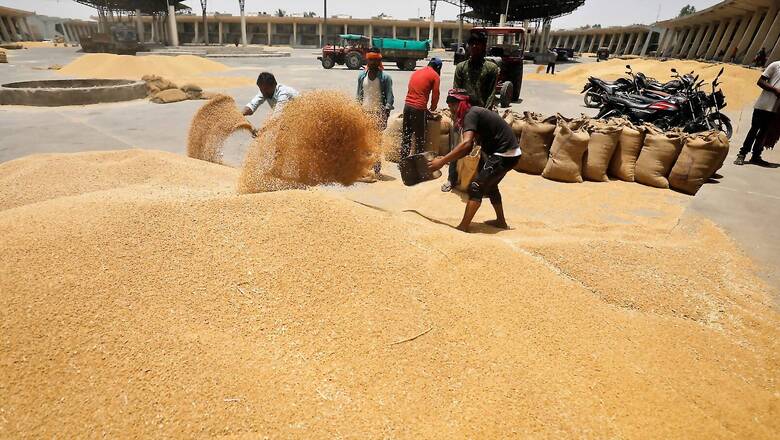
views
Cooperative movement is not new in India. Almost a century-and-a-half ago, the Deccan Riots of 1875, a result of British policies to access cheap Indian cotton, led to deep fissures between peasants and moneylenders in Pune and nearby areas.
The British government passed The Deccan Agriculturists’ Relief Act in 1879 to address the imbalances caused by their policies through the American war. However, the farmers in Maharashtra continued to demand a cooperative structure which would enable them to negotiate with the moneylenders collectively. This demand persisted for many years, and in 1904, the colonial government passed the Cooperative Societies Act.
The Cooperative Societies Act of 1912 increased the scope of cooperatives and then the Government of India Act 1919 shifted the topic of cooperatives to then provinces. Since then, the states have had control of the cooperatives, a subject now mentioned in the State List in the Seventh Schedule of the Constitution. However, multistate cooperative societies (MSCS) come under the ambit of the central government through an Act passed in 2002.
Over the years, cooperatives have found their place in many sectors, but none more so than in agriculture, banking and education. Every state has cooperatives in multiple sectors with varying degrees of influence over politics and policy. This influence has long been recognised.
A 2002 report prepared by the Ministry of Agriculture had identified the lack of suitable institutional, legislative and policy support as key reasons for not unlocking the true potential of cooperatives.
In 2021, the government formed a separate Ministry of Cooperation with the aim of improving ease of doing business for cooperatives and the development of multistate cooperative societies. The ministry has since been focusing on initiatives which would modernise cooperatives, introduce technology and professional management and create competitive cooperatives.
These initiatives would benefit the members of the cooperatives, creating collective buying and selling power, improving access to markets and infuse business skills, moving these largely incongruous entities from being political vehicles to seeking shared prosperity. The ministry has been working on the principle of Sahakar Se Samruddhi articulated by Prime Minister Narendra Modi.
The nascent ministry, headed by Amit Shah, who is also the Home Minister, has already covered significant ground in launching interesting and impactful programs to meet the challenges of fine-tuning this economic development model.
The ministry is working on a National Cooperative Policy engaging legal, economic and sectoral experts in the process. A national cooperative database is also being prepared to understand the full scale of operations and the impact of cooperatives in the country.
The ministry has started the process to onboard 63,000 Primary Agricultural Cooperative Societies (PACS) on a common national software providing Enterprise Resource Planning (ERP) services. Individually, these PACS would not have the financial wherewithal and in many cases, the management vision, to undertake such digitalization. However, with the Rs 2,516-crore program of the ministry, thousands of cooperatives can leapfrog into the digital era at once.
This technology transformation initiative will also link PACS to district cooperative banks, which will be linked to state cooperative banks. This will allow easier audits of PACS and promote better tracking of agriculture credit flow.
To meet the twin objectives of digitalization and creating new economic avenues, the ministry signed a Memorandum of Understanding (MoU) in February 2023 with the Ministry of Electronics and Information Technology, NABARD and Common Services Centre (CSC) e-Governance Services India Limited to enable PACS to provide services offered by Common Service Centres.
The ministry has also prepared model bylaws which can be adopted by PACS, allowing them to undertake more than 25 new business activities, including banking correspondent work, setting up CSCs, dairy, distribution of petrol, LPG and green energy, fishery, godown setup and LPG/ Petrol/Green energy distribution agencies.
Cooperatives have also been permitted to register as ‘buyer’ on the Government e-Marketplace (GeM), which would enable them to procure goods and services from nearly 40 lakh registered vendors. This flexibility would not just reduce the cost of operations for the cooperatives, but also promote transparency in business operations.
The Minimum Alternate Tax (MAT) for cooperatives has been reduced from 18.5% to 15%. New cooperatives undertaking manufacturing activities commencing before March 31, 2024 will be subject to a flat lower tax rate of 15%. The cash withdrawal limit for cooperatives without being subjected to tax deducted at source has been increased from Rs 1 crore to Rs 3 crore.
The ministry is also engaging in setting up new MSCS, with specific domain focus. A seed society will be set up as the umbrella organization for quality seed cultivation, production and distribution under a single brand. Similarly, another society is planned to be set up as the umbrella organization to produce, distribute and market certified and authentic organic products.
Finally, a society for promoting exports from cooperative sector is also being set up. These interventions will provide new economic avenues for growth for the members of the cooperatives.
The cooperative model of development continues to be very relevant in India, with rural economic actors remaining small in operations, even if they are getting increasingly formalized. This model provides a new avenue for them to expand their sphere of business influence and partake in the economic growth that the country is witnessing and will continue to witness in the times to come.
The Ministry of Cooperation is breaking new ground in promoting grassroots economic growth and has already achieved a lot in less than two years of its operation. These initiatives may be key to establishing an indigenous model of economic empowerment.
Aashish Chandorkar is Counsellor at the Permanent Mission of India to the World Trade Organization, Geneva. The views expressed in this article are those of the author and do not represent the stand of this publication.
Read all the Latest Opinions here




















Comments
0 comment